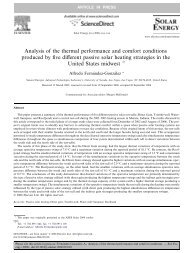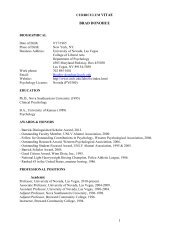2013 Conference Proceedings - University of Nevada, Las Vegas
2013 Conference Proceedings - University of Nevada, Las Vegas
2013 Conference Proceedings - University of Nevada, Las Vegas
- No tags were found...
Create successful ePaper yourself
Turn your PDF publications into a flip-book with our unique Google optimized e-Paper software.
DiscussionOn part I <strong>of</strong> the survey the teacher’s chose their view <strong>of</strong> the nature <strong>of</strong> mathematics. If theaverage score was 4 – 5, then the person had a more applied (fallibilist) view <strong>of</strong> the nature <strong>of</strong>mathematics. If the average score was 3, then the person had a mixed view <strong>of</strong> the nature <strong>of</strong>mathematics. If the average score was 1 – 2, then the person had a more pure (absolutist) view<strong>of</strong> the nature <strong>of</strong> mathematics. From the teacher’s view <strong>of</strong> mathematics we see two <strong>of</strong> them areclassified as having a mixed view, while all <strong>of</strong> the others scored between 3 and 4. While not“clearly” in the Fallibilist camp these teachers did appear to be more open toward the belief thatthe nature <strong>of</strong> mathematics may not be fixed and that what is important regarding mathematics isevolving. It is also fair to say that their original belief about mathematics is still nearly asinfluential despite hundreds <strong>of</strong> hours <strong>of</strong> pr<strong>of</strong>essional development working to open up theirviews and beliefs.In part two <strong>of</strong> the survey the teachers indicated their view <strong>of</strong> mathematics teaching andlearning. If the average score was 4 – 5, then the person had a more social constructivist view <strong>of</strong>the nature <strong>of</strong> mathematics education. If the average score was 3, then the person had a mixedview <strong>of</strong> the nature <strong>of</strong> mathematics education. If the average score was 1 – 2, then the person hada more authoritarian view <strong>of</strong> the nature <strong>of</strong> mathematics education. Four <strong>of</strong> the teachers scored asbeing social constructivist, two averaged 3, which means they have a mixed view, and theremaining five teachers scored between 3 and 4. So nine <strong>of</strong> the teachers seem to believe that thenature <strong>of</strong> teaching and learning <strong>of</strong> mathematics is aligned more closely to a social constructivistpoint <strong>of</strong> view. We believe that these scores should be interpreted as steps toward changes inteaching. When we reviewed the RTOP scores the teachers were still predominately teaching bytelling as opposed to helping students to make sense <strong>of</strong> the mathematics on their own. Thispassage from the final report about the RTOP results clarifies how teachers are talking abouttransforming their classes but they haven’t yet made these changes in their own teaching.The teaching style is almost exclusively teacher-focused where the teachermaintains the role <strong>of</strong> the mathematical authority. Teachers have voiced their lackconfidence in the students’ ability to be challenged either believing the students lackpre-requisite knowledge or/and a disposition toward mathematical thinking andperseverance. This belief plays out in many <strong>of</strong> the observed lessons. In grant<strong>Proceedings</strong> <strong>of</strong> the 40 th Annual Meeting <strong>of</strong> the Research Council on Mathematics Learning <strong>2013</strong> 122




